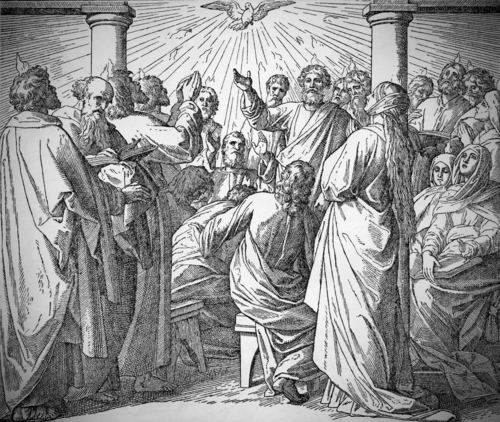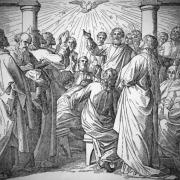“What the World Needs Now” – Matthew 5:13 – September 25 2020
/0 Comments/in Enduring Words for Troubled Times/by David Guzik“The Power of God’s Word” – 2 Kings 22:8, 10 – September 24 2020
/0 Comments/in Enduring Words for Troubled Times/by David Guzik“But Did You Go?” – Exodus 4:18 – September 23 2020
/0 Comments/in Enduring Words for Troubled Times/by David Guzik“The Battle Before the Battle” – 1 Samuel 17:28-30 – September 22 2020
/0 Comments/in Enduring Words for Troubled Times/by David Guzik“Pentecost” – Acts 2:1 – September 21 2020
/0 Comments/in Enduring Words for Troubled Times/by David GuzikA Rushing Mighty Wind
/3 Comments/in Weekly Devotional/by David GuzikAnd suddenly there came a sound from heaven, as of a rushing mighty wind, and it filled the whole house where they were sitting. Then there appeared to them divided tongues, as of fire, and one sat upon each of them. And they were all filled with the Holy Spirit. (Acts 2:3-4a)
After Jesus ascended to heaven, the disciples met to pray and seek God, waiting for the promised gift of the Holy Spirit. God kept His promise, and these words from Acts 2 tell how the Holy Spirit came upon the disciples on Pentecost. This outpouring of the Holy Spirit came with some strange things: a strange sound and a strange sight.

Notice the strange sound: suddenly there came a sound from heaven. The association of the sound of a rushing mighty wind, filling the whole house, with the outpouring of the Holy Spirit probably has connection with the fact that in both the Hebrew and Greek languages, the word for spirit is the same word for breath or wind. Here, the sound from heaven was the sound of the Holy Spirit being poured out on the disciples.
The sound of this fast, mighty wind would make any of these disciples who knew the Hebrew Scriptures think of the presence of the Holy Spirit.
– In Genesis 1:1-2, it is the Spirit of God as the breath/wind of God, blowing over the waters of the newly created earth.
– In Genesis 2:7, it is the Spirit of God as the breath/wind of God, blowing life into newly created man.
– In Ezekiel 37:9-10, it is the Spirit of God as the breath/wind of God, moving over the dry bones of Israel bringing them life and strength.
This single line tells us much about how the Holy Spirit moves.
– Suddenly: Sometimes God moves suddenly.
– Sound: It was real, though it could not be touched; it was something real that came through their ears.
– From heaven: It wasn’t of earth; it was not created, manipulated, or fashioned here.
– Mighty: It was full of force, coming with great power.
Notice that this happened nowhere else in Acts when the Spirit was poured out. Several other times the Holy Spirit powerfully filled the people of God (Acts 4:8, 4:31, 13:9, 13:52, 19:6). Those were wonderful and valid works of the Spirit, yet on none of those other occasions did they hear a sound from heaven, as of a rushing mighty wind. The strange sound was for that particular day, but not of lasting importance.
Sometimes, God does “one-offs” – a special something for a single occasion. Can you imagine if, on a later occasion the disciples said, “Today we weren’t really filled with the Spirit because we never heard that sound”? Or, if they said, “Next time we must hear the same sound – and hear it even louder!”
That kind of thinking is a trap. Give God the credit to know when a special experience is necessary, and when it is not.
Sie wurden alle vom Heiligen Geist erfüllt
/0 Comments/in Wöchentliche Andacht/by David GuzikUnd es entstand plötzlich vom Himmel her ein Brausen wie von einem daherfahrenden gewaltigen Wind und erfüllte das ganze Haus, in dem sie saßen. Und es erschienen ihnen Zungen wie von Feuer, die sich zerteilten und sich auf jeden von ihnen setzten. Und sie wurden alle vom Heiligen Geist erfüllt. (Apostelgeschichte 2,2-4a)
Als sich 120 Nachfolger Jesu versammelten, so wie es ihr Retter ihnen gesagt hatte, geschah etwas Bemerkenswertes. Die „Taufe mit dem Heiligen Geist“, die Jesus in Apostelgeschichte 1,5 verheißen hatte, kam auf sie. Sie wurden alle mit dem Heiligen Geist erfüllt.

Man darf nicht vergessen, dass dies nicht die erste Erfahrung der Jünger mit dem Heiligen Geist war. Die Person und das Wirken des Heiligen Geistes war ihnen nicht fremd.
-
Die Jünger hatten das Wirken des Heiligen Geistes fortwährend im Dienst von Jesus gesehen.
-
Die Jünger hatten die Kraft des Heiligen Geistes erfahren, als sie hinausgingen und Gott dienten (Lukas 10,1-20).
-
Die Jünger hatten die Verheißung von einem neuen, kommenden Wirken des Heiligen Geistes, die Jesus ihnen gegeben hatte, gehört (Johannes 14,15-18).
-
Die Jünger erhielten den Heiligen Geist auf eine neue Weise, nachdem Jesus Sein Werk am Kreuz vollendet hatte und einen neuen Bund in Seinem Blut errichtete (Johannes 19-23).
Doch es gab noch mehr für sie, das sie empfangen und erleben sollten in Bezug auf den Heiligen Geist – und hier in Apostelgeschichte 2 empfingen sie mehr.
Apostelgeschichte 2 erzählt uns sehr viel über den Heiligen Geist.
-
Das Füllen mit dem Heiligen Geist ist uns versprochen.
-
Das Füllen mit dem Heiligen Geist ist es wert darauf zu warten.
-
Das Füllen mit dem Heiligen Geist kommt so, wie Er es will, nicht so, wie wir es erwarten.
-
Das Füllen mit dem Heiligen Geist kommt nicht nur auf Einzelne, sondern auch auf Gruppen (siehe auch Apostelgeschichte 2,4; 4,31 und 10,44).
-
Das Füllen mit dem Heiligen Geist geschieht oft dann, wenn sich Gott um unser Fleisch kümmert und man sich selbst stirbt.
Es ist aber auch wichtig zu sehen, was Apostelgeschichte 2 und nicht über das Füllen mit dem Heiligen Geist sagt.
-
Für das Füllen mit dem Heiligen Geist gibt es keine Formel.
-
Das Füllen mit dem Heiligen Geist kann man sich nicht verdienen, indem man danach sucht. Es ist immer ein Geschenk Gottes.
Niemand kann abstreiten, dass das eine gute Sache war. In den Evangelien sehen wir eine Menge Schwachheiten und Schwankungen in den Jüngern, die Jesus nachfolgten. Nach dem Füllen mit dem Heiligen Geist waren es andere Menschen. Sie waren nicht perfekt, doch sie waren anders.
Das Kommen des Heiligen Geistes und das Erfülltsein von Ihm war so gut, so wichtig für die Gemeinschaft der frühen Christen, dass Jesus tatsächtlich sagte, dass es besser sei, wenn Er die Erde verlässt, damit Er den Heiligen Geist senden konnte (Johannes 16,7).
Dieses Füllen mit dem Heiligen Geist ist für dich (Lukas 11,9-13). Bitte Gott heute darum.
Todos llenos del Espíritu Santo
/0 Comments/in Devocional Semanal/by David GuzikY de repente vino del cielo un estruendo como de un viento recio que soplaba, el cual llenó toda la casa donde estaban sentados; y se les aparecieron lenguas repartidas, como de fuego, asentándose sobre cada uno de ellos. Y fueron todos llenos del Espíritu Santo. (Hechos 2:2-4a)
Cuando los 120 seguidores de Jesús se reunieron de acuerdo con el mandato de su Salvador, sucedió algo extraordinario. El bautismo del Espíritu Santo que Jesús les había prometido en Hechos 1:5 vino sobre ellos. Leemos que fueron todos llenos del Espíritu Santo.

Es importante recordar que esta no fue la primera experiencia que los discípulos de Jesús tuvieron con el Espíritu Santo. Ellos no eran ajenos a la persona y obra del Espíritu Santo.
– Los discípulos vieron al Espíritu Santo obrar continuamente para el ministerio de Jesús.
– Los discípulos experimentaron algo del poder del Espíritu Santo cuando sirvieron a Dios (Lucas 10:1-20).
– Los discípulos escucharon a Jesús prometer una nueva obra venidera del Consolador (Juan 14:15-18).
– Los discípulos recibieron el Espíritu Santo de una manera nueva después de que Jesús terminó su obra en la cruz e instituyó con su sangre el nuevo pacto (Juan 20:19-23).
Pero aún con todo eso, todavía había más que recibir y experimentar con respecto a la obra del Espíritu Santo, y recibieron más aquí en Hechos 2.
Hechos 2 nos enseña mucho sobre el llenamiento del Espíritu Santo.
– Se nos promete el llenamiento del Espíritu Santo.
– Merece la pena esperar la llenura del Espíritu Santo.
– La llenura del Espíritu Santo viene como Él quiere, a menudo no de acuerdo con nuestras expectativas.
– La llenura del Espíritu Santo puede venir no solo sobre individuos, sino también sobre grupos (véase también Hechos 2:4, 4:31 y 10:44).
– La llenura del Espíritu Santo a menudo se da cuando Dios trata con nuestra carne y morimos a nosotros mismos.
También es importante ver lo que Hechos 2 no nos dice sobre la llenura del Espíritu Santo.
– La llenura del Espíritu Santo no se da según una fórmula.
– La llenura del Espíritu Santo no se gana. Siempre es un don gratuito.
Nadie puede negar que esto fue algo bueno. En los Evangelios, vemos mucha debilidad y vacilación en estos discípulos mientras seguían a Jesús. Pero después de esta llenura del Espíritu Santo, eran personas diferentes. No eran perfectos; pero eran diferentes.
Esta venida y llenura del Espíritu Santo era tan buena, tan esencial para el trabajo de la comunidad de los primeros cristianos, que Jesús dijo que era mejor para Él dejar la tierra corporalmente para poder enviar al Consolador (Juan 16:7).
Esta llenura del Espíritu Santo es para ti (Lucas 11:9-13). Pídele a Dios la llenura hoy.
Haz clic aquí para el comentario de David de Hechos 2




